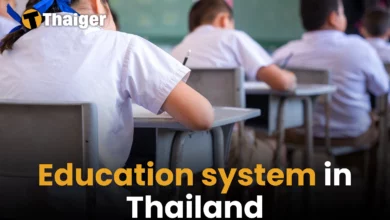Thailand’s bold journey to a tech-driven education landscape

In the core of Southeast Asia, Thailand is embarking on a transformative journey, utilizing technology to overhaul its education system fundamentally. This endeavour to comprehend the significant impact of digital advancements on Thai education encapsulates a narrative of innovation and growth. The narrative extends beyond the mere incorporation of technological tools into educational settings; it represents a profound shift in the methodologies of knowledge dissemination and acquisition.
The drive towards digitization in Thai universities transcends being merely a contemporary trend; it is a strategic initiative aimed at establishing Thailand as a frontrunner in the digital era. With digitalization accounting for over half of global technological advancements, Thailand is keenly aware of the substantial benefits that digital tools offer for achieving educational excellence. This initiative is designed to render learning processes more accessible, engaging, and relevant to the exigencies of the contemporary world.
As Thailand aims for developed nation status by 2037, the pivotal role its universities play in cultivating digitally literate citizens and pioneering future technologies becomes increasingly paramount. The move towards digital university readiness is not solely about anticipation for what lies ahead; it encompasses active participation in moulding the future. We invite you to explore how technology is revolutionizing education in Thailand, positioning it as a lighthouse of digital innovation within the region.
Overview of education in Thailand
In Thailand, the advancement toward Digital Transformation in Education is significantly altering the educational paradigm. The fundamental objective of integrating technology within Thai education systems is to cultivate an ecosystem conducive to digital literacy. This endeavour not only improves accessibility but also guarantees a more inclusive and enriching learning experience for students nationwide.
An analysis of the evolution of the Thai education system demonstrates the country’s steadfast commitment to narrowing the divide between conventional pedagogical techniques and contemporary, technology-based methodologies. This shift towards Educational Technology (EdTech) in Thailand reflects a comprehensive strategy aimed at equipping students with essential skills for thriving in the digital age.
As part of this evolutionary process, a variety of digital platforms and tools have been implemented in classrooms. These technologies are crafted to offer interactive, personalized learning experiences that address the unique requirements of each student. The outcome is a dynamic educational setting where both educators and learners can maximize the utility of digital assets.
Historical perspective of technology in Thai education

Early adoption of technology in Thai schools
Thailand’s journey with technology in education began much earlier than one might expect. As early as the late 1990s, Thai schools started experimenting with computers and internet-based learning platforms. This early adoption marked the initial steps towards integrating EdTech in Thailand. Schools in urban areas were the first to enjoy these resources, showcasing educational software and online learning materials. This phase was crucial; it highlighted the potential benefits of technology in enhancing student learning experiences.
However, it wasn’t just about having computers in classrooms. The focus gradually shifted towards utilising these technologies to develop digital literacy among students and teachers alike. Workshops and training sessions became part of the curriculum, aiming to equip the educational community with the necessary skills to navigate this new digital landscape.
Challenges faced in integrating technology
Despite the enthusiasm for EdTech in Thailand, the journey hasn’t been without its challenges. One of the most significant roadblocks has been infrastructure. Not all schools can access reliable internet or afford the latest technology. This disparity particularly affected rural and underserved communities, creating a digital divide that persists.
Another significant obstacle has been the preparedness and attitudes of educators towards incorporating technology into their pedagogical practices. While a segment of teachers has welcomed these innovations, others have shown reluctance, attributable to either a deficiency in training or a lack of confidence in deploying new technologies efficiently. This underscores a disparity in professional development and support necessary for teachers to seamlessly integrate Educational Technology (EdTech) tools into their curriculum.
Moreover, there persists an essential demand for high-quality educational materials that are both pertinent and available in the Thai language. The dearth of resources specifically designed to align with the Thai curriculum exacerbates this challenge, impeding the optimal utilization of technology within educational frameworks. The endeavour to weave technology into the fabric of Thai education continues, marked by ongoing advancements and solutions aimed at surmounting these hurdles.
Current technological landscape in Thai education

Government initiatives in tech integration
Your understanding of technology’s role in Thai education isn’t complete without exploring government efforts. They are pivotal in integrating EdTech into classrooms. Digital Transformation Thailand’s education plan stands out as a prime example. It aims to diminish the digital divide. This initiative is more than a policy; it’s a roadmap guiding schools through the 21st century. The government also focuses on enhancing digital literacy skills among students and teachers alike. They’re investing in infrastructure and readying educators to lead this charge into the future.
The Ministry of Education’s strategic actions from 2005 to 2008 set ambitious targets. They aimed for vocational enrolments to represent 50% of all upper-secondary enrolments. Despite challenges, this goal highlights the shift towards practical digital skills in the workforce. In addition, initiatives like Vocational Education and Training (VET) programs underscore the commitment to upskill the labour force.
Impact of technology on teaching and learning
The advent of technology in Thai classrooms has changed the educational landscape. It juggles improving instruction and engaging learners. Digital tools offer personalized instruction, increasing practice opportunities. They extend available learning time beyond traditional classrooms. Systematic reviews over the past two decades reveal technology’s positive impact on learning. Results show small to medium-sized benefits over conventional methods.
Yet, attributing these positive outcomes solely to technology would be oversimplified. The blend of technology with added instructional time, resources, and teacher support is a potent formula. It’s not just about having digital tools, but how they are integrated into the learning process that counts.
During the COVID-19 pandemic, Thai higher education faced a massive shift. Universities rapidly transitioned to online teaching. This disruptive period forced faculty to adapt and explore new online teaching and learning ecologies. It showcased technology’s capabilities and limitations in an unplanned, real-world experiment. Insights from this period are shaping future approaches to technology in education, focusing on methods, resources, teacher roles, and student responsibilities.
Technology in Thai education is a dynamic force. It’s shaping how educators teach, how students learn, and how the country prepares its future workforce. The government’s initiatives and the practical impacts of technology on teaching and learning are clear indicators. Thailand is on a path towards a more inclusive, innovative, and technologically advanced educational landscape.
Future trends in tech-driven education
As you’ve seen, Thailand’s journey towards integrating technology into education is not just about adopting digital tools but about creating a future where every learner has access to quality education. With initiatives like the Digital Transformation Thailand education plan, the country is paving the way for a more inclusive, innovative, and technologically advanced educational landscape. The shift to online teaching, hastened by the pandemic, has revealed the potential for technology to transcend traditional learning barriers. Looking ahead, you can expect Thailand to continue leveraging technology not only to enhance teaching and learning experiences but also to prepare students for a digital world. The focus will likely remain on closing the digital divide, fostering digital literacy, and encouraging innovation within educational institutions. As technology evolves, so too will the opportunities for learners across Thailand to achieve their full potential in an increasingly digital era.
Combating AI-driven cheating demands a multifaceted approach that includes updating academic integrity policies, employing technology to detect unauthorized AI use, and fostering an educational culture that prioritizes learning and ethical behaviour. By investing in training for educators, developing sophisticated detection tools, and encouraging open dialogue about the implications of AI in academics, institutions can stay one step ahead in preserving the integrity of educational achievements in the age of artificial intelligence.

































